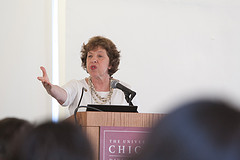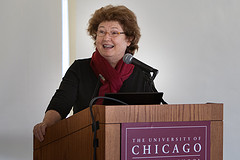Conference Description
“My dream is to see this entire forest conserved because we know it can guarantee the future of all the people who live in it. Not only that, I believe that in a few years the Amazon can become an economically viable region not only for us, but for the nation, for all of humanity, and for the whole planet… We realized that in order to guarantee the future of the Amazon we had to find a way to preserve the forest while at the same time developing the region’s economy. We accepted that the Amazon could not be turned into some kind of sanctuary that nobody could touch. On the other hand, we knew it was important to stop the deforestation that is threatening the Amazon and all human life on the planet. We felt our alternative should involve preserving the forest, but it should also include a plan to develop the economy. So we came up with the idea of Extractive Reserves.”
Fight for the Forest: Chico Mendes in His Own Words.
London: Latin America Bureau (1989).
On November 5-6, 2009 the Center for Latin American Studies and the Program on Global Environment at The University of Chicago convened an interdisciplinary conference on “Environmental Policy, Social Movements, and Science for the Brazilian Amazon”. The conference was designed to assess the last twenty years of regional structural projects, social movements, and science and technology in the Amazon, as well as what roles and opportunities are created for the region by science, technology, traditional knowledge and markets for environmental services, within the standards of forest preservation.
Scientists, politicians, anthropologists, economists, and leaders of non-governmental organizations gathered with University of Chicago faculty and students to address such questions as: Were the hopes kindled by the Bruntland report in 1987, by the social-environmental activism of Chico Mendes until 1988, and by the Rio Earth Summit in 1992 translated into effective policies? What new issues have emerged since then as strategically crucial for solving the intertwined problems of poverty, forest conservation, and development? How are the stakeholders acting today on these issues?
Through their presentations, and the vibrant exchanges during the discussion periods, participants analyzed the positive changes and the shortcomings in policy. Particular emphasis was directed toward the growing emphasis on market-oriented solutions to conservation and development problems, and toward exploring the challenges of articulating traditional knowledge with modern science in developing alternative strategies for education, health, and economic development.
The conference was organized around three broad topics:
Panel 1 - Models of Development - An Assessment of the Last 20 Years of Public Policies for the Amazon Region. Paradoxically, the policies we see today in the Amazon are strikingly similar to those that were in place during the military dictatorship. Very little has changed in those policies since then, while the world, in contrast, has changed vastly.
Panel 2 – Social Movements and Chico Mendes’ Legacy for the Sustainable Development of the Amazon. As a consequence of a popular government in Brazil, local social movements have significantly reduced their activities or changed their historical objectives. Until recently, territorial security was the main objective of social movements in Amazonia. What happens now that this objective is achieved? What are the social movements’ agendas now?
Panel 3 – Science and Technology as a Basis for a New Development Model for the Amazon. What opportunities do science and technology offer as a basis for a new development model that has the forest and the environmental services it offers as its main focus? Topics such as climate change, biodiversity valuation, and carbon sequestration or storage will be discussed, always with attention to the role that can be imparted by traditional knowledge.




